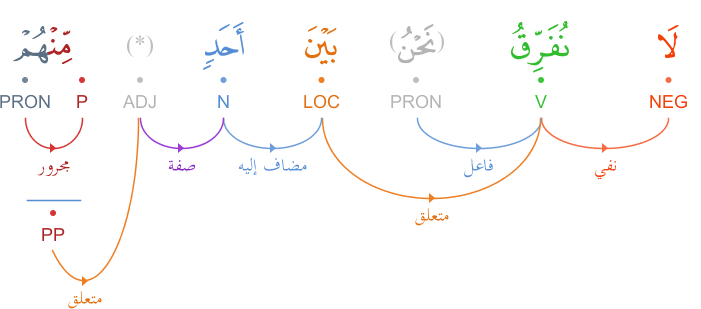|
o Beginning is with Allah's personal name Ar'Reh'maan Who is The Fountain of Infinite Mercy. |
||
|
Seclude: isolate somebody: to remove somebody from contact with others
2:136 Translation by 42 Translators
Graphic credit: Leeds University In Arabic: إعرا ب القرآن Syntactic Analysis
Root: ص ح ب associated, kept company, or consorted, with him----Lane Lexicon
Root: ش ى ع Lane Lexicon-It became spread, published, divulged, revealed, made known, or disclosed, scattered, or dispersed Root: ح ز ب Lane Lexicon
|
The Believers are asked to make a declarative pronouncement of their ideological belief; which is in sharp contrast to the belief of Jews and Christians, in these words:
The addresses of
declarative statement in the Ayah-Unitary Verbal Passage are the Jews
and Christians. All the names
are those that are recognized and
accepted by both these communities. The Jews
seclude
Easa
alai'his'slaam as well the Last
Messenger Muhammad
Sal'lallaa'hoalaih'wa'salam
from the Group described by Arabic
Adjective resembling participle
We firstly pronounce
that we heartily believe in that which is communicated to us,
i.e.
We emphasize the ideological difference we have with Jews and Christians by stating: We do not castoff-seclude a single one from amongst them. This declaration of ideological belief is the subject of our study. It is necessitated since George Sale, perhaps the first English translator of Qur'aan, published in 1734, had erroneously translated it, "We make no distinction between any of them". It is intriguing that what made him select word "distinction" which has no remote relevance with Arabic Verb in the text. That day onwards, we find the same word repeated by majority of translators, who merely "re-translated" or "re-worded by choice of synonyms" the earlier translated material without re-visiting the Arabic text of Qur'aan.
It is strange
that even some
of those who
heavily rely
upon Classical
Exegeses like
تفسير الجلالين
and تفسير الطبري
and
تفسير القرطبي
also
ignored what was
stated therein.
They had stated that
it negated the
belief of Jews
and Christians
denying someone
as included in
the Group of
Grammatical parsing of the above sentence is as under:
Arabic, as is well known, is the language based on Roots, three or four consonants placed in a peculiar sequence which signify a specific and exclusive perception and signification. Words, originating from these Roots on various well defined patterns-moulds-structuring frames, retain the original perception infolded in the Root with additional meanings and connotation, shades and colours added by peculiar pattern-placing of vowels-syllabification, addition of consonants. Basic perception infolded in Root "ف ر ق" as reported in لسان العرب Arabic Classical Lexicon is that of: الفَرْقُ: خلاف الجمع That it denotes an act opposite to collection, inclusions, assembling, gathering, assembly. It signifies separating, disjoining, dispersing, or seclude. Lane's Lexicon states: [2 فرّقهُ , inf. n. تَفْرِيقٌ and تَفْرِقَةٌ, He separated it [into several, or many, portions]; disunited it [i. e. a thing, or a collection of things]; or dispersed, or dissipated, it; or did so much [or greatly or widely]; syn. بَدَّدَهُ. And فرّق بَيْنَ الأَشْيَآءِ [He made, or caused, a separation &c., or much, or a wide, separation, &c., between the things].
World English Dictionary distinction: — n 1. the act or an instance of distinguishing or differentiating 2. a distinguishing feature 3. the state of being different or distinguishable 4. special honour, recognition, or fame 5. excellence of character; distinctive qualities: a man of distinction 6. distinguished appearance 7. a symbol of honour or rank Encarta: 1. difference: a difference between two or more people or things, or the recognition of such a difference 2. high quality: excellence in quality or talent 3. something to be proud of: something done or given as a mark of respect or honor 4. distinguishing feature: a feature or quality that characterizes or singles out somebody or something One of the unique features of Grand Qur'aan is that it has built in system to serves as a Lexicon for its important words and terms. It helps conveniently detect and catch the distortions made by translators and exegetes. Perception infolded in Root: "ف ر ق" is portrayed by contrast words in real situations:
Let us see other tenses like the
The effect and state that emerges by
the act in Form-II; masculine; plural perfect Verb
Grand Qur'aan has also used the Verbal Noun of Form-II Verbs of this Root:
It might seem strange
that
despite such an elaborate explanation in Qur'aan about Verb
What is the importance and implications of this belief? Why we emphasize upon the Jews and Christians that we do not seclude a single one from the Galaxy of Messengers? The reason is:
This is the prerequisite, the fundamental condition to become eligible for taking part in the marathon to the Paradise. Those who seclude even a single Messenger of Allah the Exalted stand disqualified and ineligible for Paradise. Allah the Exalted tells us about the possibilities of their response to our statement:
|
